Home | Category: Gods and Mythology
MAJOR GREEK GODS
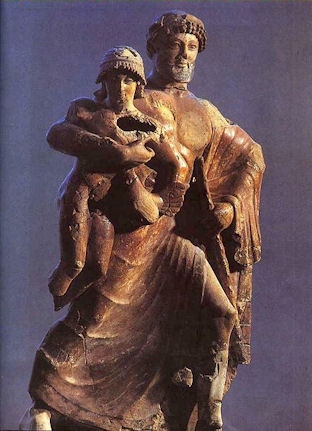 1) Zeus (Jupiter to Romans) was the supreme god.
1) Zeus (Jupiter to Romans) was the supreme god.
2) Poseidon (Neptune to Romans) was the god of the sea and brother of Zeus.
3) Hades (Pluto to the Romans) was god of the Underworld and brother of Zeus.
4) Hestia was the goddess of hearth and home and sister of Zeus. She was associated with stability, domestic well-being, and the ritual of naming children.
5) Hera (Juno to Romans) was the god of marriage and the wife of Zeus.
6) Hephaestus (Vulcan to Romans) was the god of fire and blacksmiths. He was the son of Hera
7) Ares (Mars to Romans) was the god of war and the son of Zeus.
8) Athena (Minerva and Pallas Athene to Romans) was the god of wisdom and skills, and the favorite daughter of Zeus.
9) Apollo (Apollo to Romans) was the god of the sun, light and music and the son of Zeus.
10) Aphrodite (Venus to Romans) was the goddess of love and daughter of Zeus.
11) Hermes (Mercury to Romans) was the god of traveling, merchants and thieves, an escort of the dead, and a messenger of the gods. He was also a son of Zeus.
12) Artemis (Diana to Romans) was the goddess of hunting, wild nature and newborn children. She was the twin sister of Apollo.
13) Demeter (Ceres to Romans) was the goddess of fertility, farming, soil, grain and the harvest. She was a sister of Zeus and had a daughter, Persephone, by Zeus.
14) Dionysus (Bacchus to Romans) was the god of drama, dance, music, fertility and wine.
15) Prometheus was giver of fire and crafts to humans. He is said to have made man from clay, and to have defied the gods by stealing fire and giving it to humanity.
Nike is the Greek goddess of victory and a companion of Athena. The chairman of the shoe company Nike, Philip Knight, originally wanted to name the company Dimension Four but was convinced by another employee to call it Nike. Triton was the trumpeter of the sea. Aeolus was the god of the wind. The Nymphs were goddesses of nature. The Naiads were water nymphs. The Erinyes were the avenging goddesses.
Websites on Ancient Greece: Internet Ancient History Sourcebook: Greece sourcebooks.fordham.edu ; Hellenistic World sourcebooks.fordham.edu ; BBC Ancient Greeks bbc.co.uk/history/; Perseus Project - Tufts University; perseus.tufts.edu ; ; Gutenberg.org gutenberg.org; British Museum ancientgreece.co.uk; Illustrated Greek History, Dr. Janice Siegel, Hampden–Sydney College hsc.edu/drjclassics ; Internet Classics Archive kchanson.com ; Cambridge Classics External Gateway to Humanities Resources web.archive.org/web; Ancient Greek Sites on the Web from Medea showgate.com/medea ; Greek History Course from Reed web.archive.org; Classics FAQ MIT classics.mit.edu
RECOMMENDED BOOKS:
“Greek Mythology: The Gods, Goddesses, and Heroes Handbook: From Aphrodite to Zeus, a Profile of Who's Who in Greek Mythology” by Liv Albert (Author), Sara Richard (Illustrator) Amazon.com;
“Theogony” by Hesiod (Oxford World's Classics) Amazon.com;
“Eros the Bittersweet” by Anne Carson (1986) Amazon.com;
“Hellenic Polytheism: Household Worship” by Christos Pandion Panopoulos (2014) Amazon.com;
“Household Gods: Private Devotion in Ancient Greece and Rome” by Alexandra Sofroniew (2015) Amazon.com;
“When the Gods Were Born: Greek Cosmogonies and the Near East” by Carolina López-Ruiz (2010) Amazon.com;
“Dawn of the Gods” by Jacquetta Hawkes (1968) Amazom.com
“D'Aulaires' Book of Greek Myths” by Ingri and Edgar Parin d'Aulaire (1962) Amazon.com;
“The Complete World of Greek Mythology” by Richard Buxton (2004) Amazon.com;
“The Greek Myths” by Robert Graves (1955) Amazon.com;
“Mythology: Timeless Tales of Gods and Heroes” by Edith Hamilton (1942) Amazon.com;
“The Mycenaean Origin of Greek Mythology” by Martin P. Nilsson (1932) Amazon.com;
“Mythos: The Greek Myths Reimagined” by Stephen Fry (2017) Amazon.com;
“Heroes” by Stephen Fry (2019) Amazon.com;
Zeus
Zeus was the supreme god, thunder god, sky god, lord of the universe, creator men and women, upholder of justice, avenger of broken promises, regulator of the seasons and protectors of kings and states . Homer wrote "No mortal could view with Zeus, for his mansion and possessions are deathless...All Olympus trembled at his nod.”
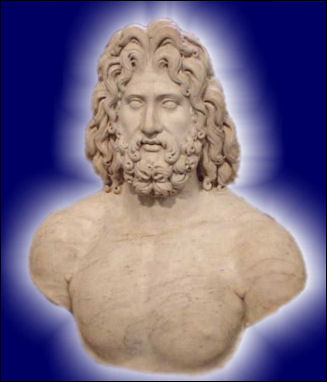
Zeus Zeus was king of the 12 major gods of Olympus and the father of many of them. Armed with a powerful thunderbolt, Zeus ruled from his throne on Mount Olympus and shared power with his brothers and sisters, six of his children and Aphrodite. His two brothers, Hades and Poseidon, reigned over the Underworld and the sea, The ox and the oak tree were sacred to Zeus
Zeus is believed to have been derived from the Indo-European sky-go Dyaus introduced by the Hellenes who invaded southern Greece from the north in second millennia B.C. The early Zeus often embraced the local earth-mother goddess as his lover. Later Zeus was worshiped so exclusively it was almost a monotheistic religion. The Olympics were conceived as a way to honor Zeus. He was originally a weather god or sky-god controlling thunder, lightening and rain but as time went on he took on more responsibilities such as upholding justice and the law. Endowed with supreme strength and wisdom he was far more powerful than the other gods but, even so, he was subject to the limitations imposed by the three Fates, who controlled the destinies of humankind and, some said, of the gods themselves." [Source: Canadian Museum of History]
Marianne Bonz wrote for PBS's Frontline: “Even in the ancient Greek poems of Homer and Hesiod, Zeus was the ruler of the gods, the most powerful and the most wise. But in his early days, Zeus also was guilty of numerous sexual indiscretions with both goddesses and mortal women. These liaisons resulted in the birth of a number of demi-gods and heroes, for whom the Greeks also established cults. Despite his wisdom and majesty, this early Zeus could also be petty, self-indulgent, and occasionally cruel." [Source: Marianne Bonz, Frontline, PBS, April 1998]
See Separate Article: ZEUS europe.factsanddetails.com
Hades
Hades was a brother of Zeus. He occupied the Underworld , also known as Hades. Hades is both the name of the Greek Underworld and the god that presided over it. After usurping the throne Zeus repelled attacks by giants and conspiracies by other gods. After the dethronement of the Titans a lottery with himself and his brothers Poseidon and Hades was held to decided who would occupy the heavens, the sea and the Underworld . Zeus won. He chose the heavens while Poseidon and Hades were awarded the sea and the Underworld respectively. The word “Hades” came from the Greek “ term a des” , meaning “the unseen” or concealed. It inhabitants were known as “Shades.” See Hades, the Underworld.
Hades was one of the Twelve Olympians, and brother of Zeus and Poseidon. He has no shrines or temples of his own, except in Elis (w. Peloponnesus), and the small temple in the Sacred Enclosure at Eleusis. Hades rarely leaves the 'House of Hades' but when he does he ride in golden chariot drawn by four black horses. Once he did go after the nymph Menthe, but Persephone turned her into a shrub ('mint'). He also hit on the nymph Leuke ('white') who became a white poplar tree. Hades is not the Devil, and does not usually punish souls in the House of Hades. Punishments take place in Tartaros. [Source: John Adams, California State University, Northridge (CSUN), “Classics 315: Greek and Roman Mythology class]
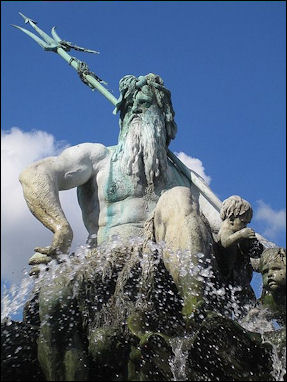
Poseidon Hades is sometimes called Zeus Katachthonios ('Underworld Zeus'). He is also known as Aidoneus and PLOUTON ('The Rich')–itles used to avoid mentioning his real name — as well as Polydegmon ('Hospitable') and Eubouleus ('He of Wise Counsel').Hades is a major figure in the myth Rape of Persephone: With Zeus' connivance, Demeter's daughter Persephone was taken to Underworld. This myth explains cycle of the seasons. Persephone is also called Eubouleia, especially in the Orphic lamellae.
Ward Hazell wrote in Listverse: In modern times, Hades is often depicted as a god who, having failed to overthrow Zeus, is banished to the Underworld. Hades is seen as a kind of fallen angel, and the Underworld as a metaphor for Hell.[5]In fact, the Underworld was the place where all human souls go after death. Though parts of the Underworld were considered a place of punishment for sinners, it also included the Elysian Fields, where heroes were bound, and the Asphodel Meadows, where the majority of souls ended up. Hades was, in fact, the ruler of the “invisible world,” and his kingdom included “all the secret places of the world.” He was the brother of Poseidon and Zeus, and the three of them cast lots to divide the world between them.Hades stayed mostly in his Underworld kingdom and rarely bothered those living elsewhere, except, of course, when he abducted Persephone. Having fallen in love with her, he created a beautiful flower that would suck her down to the Underworld when picked. Zeus was forced to negotiate her release, but because of some injudicious pomegranate eating, she was doomed to spend a third of every year in the Underworld with Hades, thus causing winter.Other than that, Hades was a pretty good guy. [Source Ward Hazell, Listverse, August 31, 2019]
See Separate Article: ANCIENT GREEKS AND THE AFTERLIFE: HADES, ASPHODEL, JUDGEMENT AND TARTARUS europe.factsanddetails.com
Poseidon
Poseidon (Neptune to Romans) was the god of the sea and brother of Zeus. He lived in an underwater golden palace and traveled around on a wave-skimming sea-shell chariot pulled by snow-white horses. His attendants included dolphins, Nereids and Tritons. He carried a trident with a three-prong spear.
One of the most powerful gods, Poseidon he could produce earthquakes by striking the Earth with his trident and huge waves and storms by striking it to the sea. When in a mellow moon he used his power to calm seas and bring forth new land from the water. Sailors prayed to him for calms seasons, raised temples to honor him and went out their way not to provoke his anger. Poseidon challenged Athena to become the patron of Athens. Each god was asked to perform a miracle. Poseidon produced a spring that turned out to be salty while Athenian produced an olive tree and was judged the winner.
Poseidon was: 1) the son of Kronos (Saturn) and Rhea; 2) brother of Zeus, Hades, Hestia, Demeter and Hera; 3) husband of Amphitrite (daughter of Doris, an Oceanid, and Nereus); she is a 'Nereid' and thus sister of Thetis (Achilles' mother). [Source: John Adams, California State University, Northridge (CSUN), “Classics 315: Greek and Roman Mythology class]
See Separate Article: POSEIDON europe.factsanddetails.com
Hephaestus
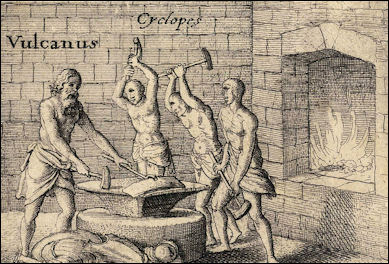
Vulcan (Hephaestus)
Lame Hephaistos (Vulcan to Romans) was the god of fire, metalworking, invention and blacksmiths. The son of Zeus and Hera, he was a kind and peaceful god in spite of his hobby of making weapons and other objects from metal using a volcano as a forge and was assisted by the one-eyed giant, the Cyclops. Vulcan gave birth the word volcano (eruptions were sparks from his anvil) and the science of vulcanology.
Hephaestus was ugly, making him the only resident of Mt. Olympus who was not beautiful. Even so he was well liked by other gods including his father. But on one occasion, when Hephaestus sided with his mother in argument Zeus threw him off Olympus. Hephaestus landed with such force he was never able to walk again without the help of two thinking robots he made from gold and silver. To keep the other gods from fighting over her, Zeus arranged the marriage of Aphrodite to Hephaestus.
The other gods mocked Hephaestus because he was lame and ugly and also because of Aphrodite's adulteries, such as her love affair with the god of war, Ares (Roman Mars).
Ares
Ares (Mars to Romans) was the god of war and essentially a troublemaker. The opposite of his brother Hephaestus, he was cruel and mean and took great pleasure from watching the slaughter and bloodshed that resulted from the wars he caused. He often mounted a chariot and joined in on the killing, not caring who won just as long as there was a lot of violence. None of the other gods cared much for Ares especially since he whined about his wounds when he returned to Olympus (even though he was immortal he still suffered injuries). He was often accompanied by Eris, the female spirit of strife. Her greatest pleasure was tossing a golden apple into a friendly gathering and watching people fight over it.
Debra Kelly wrote in Listverse: Ares might be the god of war, but he’s also a coward—and his family hates him for it. Zeus and Hera tend to look on their son with little more than disdain, and his sister Athena shares his place as a deity overseeing war. While Ares personifies the aspects of havoc and bloodshed, Athena’s place is as a goddess of defense, strength, and righteous battle—and Ares bows to her. [Source Debra Kelly, Listverse, December 17, 2013]
Both feature in The Iliad, and more than once, Athena intervenes against Ares on behalf of a fair and righteous battle. Ares consistently backs down and even relies on Athena to protect him from the wrath of his parents. When Ares does have success on the battlefield, it’s at Athena’s side. When he challenges Athena, he loses—badly. Ares is portrayed as whining to his father when the goddess of wisdom and strategic warfare puts him back in his proper place, and his complaints are met with a less than fatherly sentiment.
On a temple dedicated to Ares, Pausanias wrote in “Description of Greece”, Book I: Attica (A.D. 160): There is also the Hill of Ares, so named because Ares was the first to be tried here; my narrative has already told that he killed Halirrhothius, and what were his grounds for this act. Afterwards, they say, Orestes was tried for killing his mother, and there is an altar to Athena Areia (Warlike), which he dedicated on being acquitted. The unhewn stones on which stand the defendants and the prosecutors, they call the stone of Outrage and the stone of Ruthlessness. On descending, not to the lower city, but to just beneath the Gateway, you see a fountain and near it a sanctuary of Apollo in a cave. It is here that Apollo is believed to have met Creusa, daughter of Erechtheus. [Source: Pausanias, “Description of Greece,” with an English Translation by W.H.S. Jones, Litt.D. in 4 Volumes. Volume 1.Attica and Cornith, Cambridge, MA, Harvard University Press; London, William Heinemann Ltd., 1918]
Apollo
Apollo (Apollo to Romans) was the god of the sun, light, music, health, healing and human enlightenment. His twin sister Artemis was the goddess of hunting and, oddly enough, guardian of wildlife. Originally called Phoebus Apollo, he lived on the island of Delos in the east, where he was born, and Delphi to the north of Athens. He drove the chariot of the sun across the sky and had the power to cure illness and inflict it.
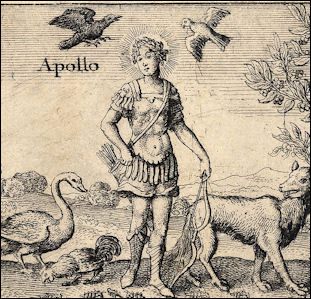 Marianne Bonz wrote for PBS’s Frontline: “Not to be confused with the sun itself, which was represented by a special divinity, Helios, Apollo was nonetheless a solar god. Because the Mediterranean sun's rays strike the earth like darts, Apollo was thought of as an archer-god, whose arrows could either wound or heal. He was also the god of song and the lyre, as well as the god of divination and prophecy. His sanctuary at Delphi was one of the most sacred places in the Greek world for revelation and interpretation.” [Source: Marianne Bonz, Frontline, PBS, April 1998]
Marianne Bonz wrote for PBS’s Frontline: “Not to be confused with the sun itself, which was represented by a special divinity, Helios, Apollo was nonetheless a solar god. Because the Mediterranean sun's rays strike the earth like darts, Apollo was thought of as an archer-god, whose arrows could either wound or heal. He was also the god of song and the lyre, as well as the god of divination and prophecy. His sanctuary at Delphi was one of the most sacred places in the Greek world for revelation and interpretation.” [Source: Marianne Bonz, Frontline, PBS, April 1998]
Apollo was worshiped by musicians and poets. He was regarded as the handsomest of the Greek gods and was the master of the Oracle of Delphi. His connection with the sun led to associations with agriculture and titles such as “destroyer of locusts,” “destroyer of mice,” “protector of gain” and “sender of fertilizing dew.”
Apollo was the son of Zeus and one of his other wives, the goddess Ledo. When Hera discovered Ledo was pregnant she forbade her offspring from being born on earth. Delos had just been created by Poseidon and was still floating around and not under Hera's authority. That is why Apollo and his twin sister Artemis were born there.
Apollo was known for his heroism. When Apollo was a young god man Zeus sent him to claim the oracle of Delphi, the most sacred place on earth and a fiery place where a priestess was told prophecies by Mother Earth. Apollo captured the oracle after slaying the deadly serpent Python, a beast no else would even approach, with a golden arrow. Myths involving Apollo include: 1) Hyacinthus and Apollo, 2) Daphne and Apollo, 3) King Midas and Apollo, 4) The Punishment of Niobe by Apollo and Artemis. See Oracle of Delphi
Apollo also could be vengeful and ruthless. Once a satyr boasted he could produce better music than Apollo and challenged him to a contest. Apollo won the contest, which was judged by the nine Muses. As punishment for being so bold as to challenge him Apollo had the uppity satyr skinned alive. Because Apollo was the god of music a number of theaters have been named after him. He also credited with inventing the flute.
See Separate Article: APOLLO europe.factsanddetails.com
Hermes
Hermes (Mercury to Romans) was the god of traveling, an escort of the dead, and a messenger of the gods. He performed his duties with the help of a pair of winged sandals given to him by his father Zeus (his mother the Titan Maia was the daughter of Atlas). Hermes was the patron of markets, merchants, thieves, and storytelling. Both merchants and thieves admired him because he was “swifter than thought.” Cairns are have traditionally been placed on the side of the road to honor him and to ensure safe passage.

Eros, Hermes and Aphrodite
Hermes was the god of culture and music (he invented the lyre, from the shell of a tortoise) and was the patron of young men, gymnasiums (each of which contained a Hermaeum) and merchants, (whom the Greeks often regarded as travelers, liars and thieves). His identifying features include his winged sandals and elaborate herald's staff (the kerykeion)Jolly and friendly, Hermes was one of the most well liked of the gods. Even Hera liked him despite the fact that he killed one of her servants, the hundred-eyed Argus. Hermes achieved this feat by telling a story that was so long-winded and tedious Argus shut all his eyes and died of boredom. As the messenger of the gods he made a number of trips to the Underworld .
Hermes was also quite clever and crafty. A few hours after he was born he found a tortoise, attached a few strings to it and invented the lyre. Later that same day he stole the oxen of his half-brother Apollo by tying brooms to their tails so they erased their tracks as they walked away. It didn't take Apollo long to uncover the trick but ultimately he was appeased by Hermes who played a beautiful song with lyre and gave it to Apollo as a gift. Apollo also used to produce beautiful music. In return Apollo gave Hermes a magic wand — the “caduceus” — that brought wealth and good fortune and turned everything it touched into gold.
The son of Zeus and Maia, Hermes was born in a cave on Mount Cyllene in Arcadia. The etymology of Hermes is unknown. H. J. Rose wrote in “A Handbook of Greek Mythology”: "We must not forget the possibility that the Arcadians found [HERMES] in Arcadia when they arrived there, and that his name is not Greek at all. Certain it is that he was often worshipped under the form of a mere stone [herma]" Martin P. Nilsson wrote in “History of Greek Religion”: "The name is one of the few that are etymologically transparent and means "he of the stone-heap" ." [Source: John Adams, California State University, Northridge (CSUN), “Classics 315: Greek and Roman Mythology class]
Stories Involving Hermes
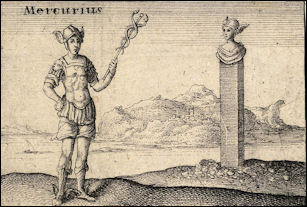 'Slayer of Argus' (in Hesiod's Theogony): John Adams, of CSUn wrote: “When Zeus was sleeping with Io and Hera became aware of it, Zeus changed himself and Io into cattle. Pretending that Io was only a heifer, Zeus could not refuse giving it to Hera when she asked. Hera assigned Argus Panoptes (‘Argus-with-eyes-all-over‘) to watch Io. Hermes lulled Argus to sleep and killed him. Thereupon Hera sent the gadfly to torment Io, who was driven mad. Argus' eyes (according to that romantic Roman mythological pervert, Ovid (Metamorphoses I. 722) were put by Hera into the tails of her favorite peacocks. [Source: John Adams, California State University, Northridge (CSUN), “Classics 315: Greek and Roman Mythology class]
'Slayer of Argus' (in Hesiod's Theogony): John Adams, of CSUn wrote: “When Zeus was sleeping with Io and Hera became aware of it, Zeus changed himself and Io into cattle. Pretending that Io was only a heifer, Zeus could not refuse giving it to Hera when she asked. Hera assigned Argus Panoptes (‘Argus-with-eyes-all-over‘) to watch Io. Hermes lulled Argus to sleep and killed him. Thereupon Hera sent the gadfly to torment Io, who was driven mad. Argus' eyes (according to that romantic Roman mythological pervert, Ovid (Metamorphoses I. 722) were put by Hera into the tails of her favorite peacocks. [Source: John Adams, California State University, Northridge (CSUN), “Classics 315: Greek and Roman Mythology class]
“Hermes Psychopompos (psyche ‘shade’ pompos ‘guide’) conducts the souls of the deceased from their bodies to the shores of the River Styx (in the Underworld) where he hands them over to the Ferryman CHARON. Hermes carries a staff with snakes wound about it as his symbol, the CADUCEUS (nowadays seen mostly on double-parked Mercedes convertibles belonging to doctors).
Hermes the Shepherd was appointed by his half-brother Apollo, after the theft and return of Apollo's sacred cattleherd (from Pieria in Macedonia). Apollo also gave Hermes some prophetic gifts as well.
Hermes the Thief (of Apollo's cattle): The Homeric Hymn to Hermes [text in Morford and Lenardon] also the thief of Apollo's quiver and arrows. Magnes, the shepherd, who kept and later suffered the loss of Apollo's sacred herd of cattle, had a son named Hymenaeus (Hymenaios), with whom Apollo was in love. Since Apollo hung around Magnes' house all the time to be with Hymenaeus, Hermes was able to make the shepherd Magnes go to sleep so that the cattle could be robbed.
Battos, an old vineyard caretaker, witnessed the theft and had the knowledge of the thief's identity and modus operandi. He was bribed with the gift of one of the cows (receiving stolen property) to keep his mouth shut. After Hermes' adventure with the cattle was over and he and Apollo had patched things up, Hermes returned to Pieria and visited Battos (in disguise). Battos blabbed the whole story, and was turned into a stone (a herm ?). [Is this an aetiological tale? or (considering that Battos means 'blabbermouth') is it an etymological tale? or is it both?]
Dionysus
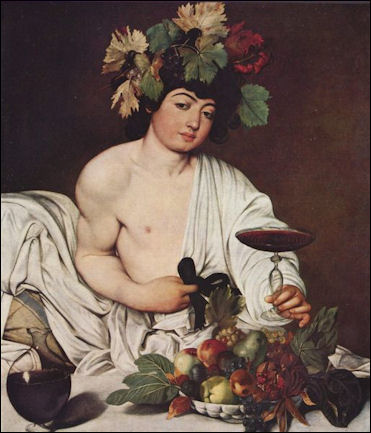
Dionysus by Caravaggio Dionysus (Bacchus to Romans) was the god of drama, dance, music, fertility and wine. He was the only god to be born twice and the only one with a mortal parent. Because of his association with drinking, partying, festivals and having a good time it is not surprising that he was one of the most popular gods. Dionysus often traveled is disguise. He was known for appearing and reappearing quickly. When he wanted to make a show he arrived with a procession of nymphs and satyrs.
Marianne Bonz wrote for PBS’s Frontline: “Although not one of the original Olympians, the cult of Dionysus was very old and was celebrated throughout the Greek world and beyond. As the god of the vine and of the pleasures of its cultivation, his cult became associated with that of Demeter at an early time. As with Demeter, his devotees ranged the entire spectrum of the social scale. Likewise, his cultic observance ranged from dignified ceremonies and parades to orgiastic celebrations and festivals. [Source: Marianne Bonz, Frontline, PBS, April 1998 ]
“Later Rome, fearing that these festivals would lead to civil unrest, attempted to suppress his cult, but it met with very little success. Although the Romans could not curtail the immense popularity of Dionysus, the god's appearance and the legends surrounding his worship did change dramatically over time.
“Even though fairly early in his history Dionysus's appearance changed from that of a mature, bearded man of a decidedly rustic quality to a long-haired and somewhat effeminate adolescent with exotic attributes, throughout most of his history his essential character remained that of a charming rogue. He was depicted as the god who brought the joys and ecstasies of the vine, as well as the fruits of civilization, and not only to Greece but also to far-away India and Egypt. But Dionysus also could reduce even people of consequence to madness, if they crossed him.
See Separate Article: DIONYSUS europe.factsanddetails.com
Asclepius, the Healing God
Asclepius was the Healing God. Marianne Bonz wrote for PBS’s Frontline: “The son of Apollo by a mortal woman, Asclepius was taken by his divine father at birth and apprenticed to a wise centaur (a mythical creature, half man and half horse). This centaur, whose name was Chiron, taught Asclepius the healing arts so that he could reduce the sufferings of mortals. With his miraculous cures, Asclepius quickly earned great fame. Motivated by compassion, he even succeeded in restoring the dead to life. But this proved his undoing. Hades complained to Zeus that if this were allowed to continue, the natural order of the universe would be subverted. Zeus agreed and struck Asclepius down with a thunderbolt. In some versions of the story, Asclepius was transformed into a star after his death. [Source: Marianne Bonz, Frontline, PBS, April 1998. Bonz was managing editor of Harvard Theological Review. She received a doctorate from Harvard Divinity School, with a dissertation on Luke-Acts as a literary challenge to the propaganda of imperial Rome.]

Asclepius
“Asclepius was an immensely popular god, originally in Greece but later also in Rome. By the fourth century before the common era, he had established a number of sanctuaries in Greece, the most important ones being in Cos and Epidauros. Early in the third century B.C., his cult was brought to Rome after the city had been struck by a plague. Asclepius's medical knowledge and divine healing powers fostered two distinct traditions within the Greek world. On the one hand, he served as a divine mentor to the doctors who treated patients at his sanctuary at Cos. On the other hand, at the sanctuary of Epidauros, the god performed miraculous cures in response to the direct petitions of suppliants.
“In the early Roman imperial era, Asclepius assumed an even greater religious importance. He had become a savior god. The physically or emotionally afflicted received long-term care and guidance at his sanctuaries, and in return they devoted themselves to his worship and service.
“The most famous of devotee of Asclepius during the Roman imperial period was the rhetor and sophist (professional public speaker) Aelius Aristides. Having just embarked on his public career, Aristides was stricken by a complete physical and mental breakdown. After seeking the help of another god to no avail, he visited the shrine of Asclepius in his adoptive city of Smyrna.
“During this visit, the god appeared to Aristides in a dream-vision, and this encounter changed his life. Asclepius not only prescribed treatments for his chronic bouts of illness, the god also offered guidance for the conduct of all aspects of his life. Thereafter, Aristides placed himself and his career under the god's protection, making numerous extended visits to the renowned Asclepius sanctuary in Pergamon. In his autobiographical narrative of his numerous encounters with the god, Aristides reveals his special relationship with Asclepius by most often addressing the god as "Savior."
Asclepius: A Model for Jesus?
L. Michael White of the University of Texas at Austin told PBS: “When Christians talked about salvation we have to understand how a pagan would have heard that term. Salvation actually is a term of healing. It's medical, and it apparently was understood to mean deliverance from disease and death. Healing, magic, medical cures are part of the Jesus tradition going way back to ... the early gospel sources, and it continues to be a very important part of Christian tradition. [Source: L. Michael White, Professor of Classics and Director of the Religious Studies Program University of Texas at Austin, Frontline, PBS, April 1998 ]

Asclepius visiting Hippocrates in Kos
One of the most prominent scenes in all the catacombs is of Jesus as healer. Jesus as magician. This is really something very important within the Roman culture, and apparently health and disease were very important issues all around. It's often suggested that the mortality rate among members of Roman cities might have been as high as fifty percent of all children born died within the first five years of life. So death and disease were all around....
“One of the most popular deities of all is Asclepius, the healing God, and it's often suggested that Jesus is kind of modeled after a new or a younger Asclepius. Asclepius is often portrayed in some ways similar to Zeus as this great, old bearded god and he also has his wife or consort. Her name is Hygeia. Her name means health in Greek, and so the worship of Asclepius the healer and of health personified as his wife are very prominent cults. Indeed, the equivalent of hospitals for ancient society was really the temple of Asclepius, and we see these in a number of places around the Greek and Roman world. ...[T]he Asclepius cult, very much like Christianity and some of the other new religions of the Greco-Roman world, was a portable cult. You could have temples of Asclepius almost anywhere. Anywhere you're willing to have one built and pay for it.
“[W]hat happened in a temple of Asclepius was that one went there to take the cures. It was kind of like a spa. You could go and sleep in the temple. They call that incubating in the temple, and bathe in their ritual baths and offer incense and prayers and buy sacrifices from the cult priests. In order to try to get the god to perform a healing, and it's interesting that we have a mixture of real medicine. That is, real scientific medical practice going on side-by-side with these religious magical kinds of healing practices. So the ancients really thought of the two things going very much hand in hand and everyone knew about Asclepius. He was one of the most important gods around. After all, who else could give you health?”
Pan
Pan was the Greek god of flocks, pastures, wilds, woods, fields and shepherds. The son of Hermes, he was greatly loved by small animals. Pan looked like a satyr but actually wasn’t and he made an effort to help travelers harassed by satyrs (the word “panic” was derived from the shock that travelers felt when Pan first appeared and was mistaken for a satyr). Pan was a gentle creature known for his beautiful pipe playing.
According to the American classicist Timothy Gantz, author of "Early Greek Myth: A Guide to Literary and Artistic Sources", Pan originally may have been a fertility deity, and his reputation included cavorting with nymphs, who were female nature deities bound to trees, streams and other features of the landscape. Tom Metcalfe wrote in Live Science Pan famously played a set of reed pipes — now called Pan pipes in his honor — and was typically portrayed as a mythical faun, with the cloven hooves, furry hind legs and horns of a goat. (The devil in Christianity is often portrayed in the same way, and the British historian Ronald Hutton argues that isn't an accident.) [Source Tom Metcalfe, Live Science , June 13, 2023]
According to the Online Etymological Dictionary, the modern English word "panic" is derived from the god's name, from the Greek word "panikon," which means "pertaining to Pan." Supposedly, Pan was responsible for making mysterious woodland sounds that "caused groundless fear in herds and crowds, or in people in lonely spots."
Eros (Cupid)
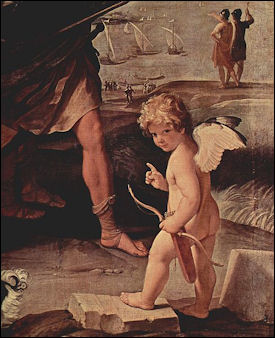
Eros Eros (Cupid) was Aphrodite's winged son. He took great pleasure in shooting arrows of love into the hearts of unsuspecting victims, who then fell in love with the first person they saw. Eros drew great enjoyment and was often beside him with laughter over trouble he caused. One story involving Cupid begins with Psyche, the beautiful daughter of a mortal king. She was so beautiful that Aphrodite was beside herself with jealousy and called in Cupid to strike her with an arrow so she would fall in life with some low life man. Instead Cupid fell in love with Psyche and brought her to his palace. She was eventually made immortal.
Ward Hazell wrote in Listverse: Eros was originally said to be the son of Chaos, though later histories said he was the son of Aphrodite and either Zeus, Ares, or maybe Hermes. Eros was the god of passion and fertility and an opponent of his brother, Anteros, who was the god of mutual love.Eros was depicted as a young man, in, shall we say, the prime of life. He was strong, handsome, and athletic. He carried a bow and a quiver full of arrows, some tipped with gold and others with lead. The gold-tipped arrows inspired extreme desire, while the lead-tipped ones produced extreme loathing. One day, angry at being mocked by Apollo, Eros shot him with a golden arrow, forcing him to fall in love with the nymph Daphne. At the same time, he shot her with a lead arrow so that she would find his advances revolting. [Source Ward Hazell, Listverse, August 31, 2019]
His other targets included Helen of Troy, who fell in love with Paris, causing all that trouble, and Psyche, who Eros bewitched to fall in love with him. He carried Psyche to a secret castle and visited her in the dead of night, refusing to reveal his identity. Psyche fell in love with him, and one night, while he slept beside her, she lit a lantern so that she could see his face, and Eros, on waking, took fright and ran away.Eros was first portrayed as a full-grown man, then a youth, then a child, and finally as a chubby, winged baby shooting indiscriminate arrows of desire, which, considering what he did to Psyche, is a little disturbing.
Image Sources: Wikimedia Commons, The Louvre, The British Museum
Text Sources: Internet Ancient History Sourcebook: Greece sourcebooks.fordham.edu ; Internet Ancient History Sourcebook: Hellenistic World sourcebooks.fordham.edu ; BBC Ancient Greeks bbc.co.uk/history/; Canadian Museum of History, Perseus Project - Tufts University; perseus.tufts.edu ; MIT Classics Online classics.mit.edu ; Gutenberg.org, Metropolitan Museum of Art, National Geographic, Smithsonian magazine, New York Times, Washington Post, Live Science, Discover magazine, Natural History magazine, Archaeology magazine, The New Yorker, Encyclopædia Britannica, "The Discoverers" and "The Creators" by Daniel Boorstin. "Greek and Roman Life" by Ian Jenkins from the British Museum, Wikipedia, Reuters, Associated Press, The Guardian, AFP and various books and other publications.
Last updated September 2024
